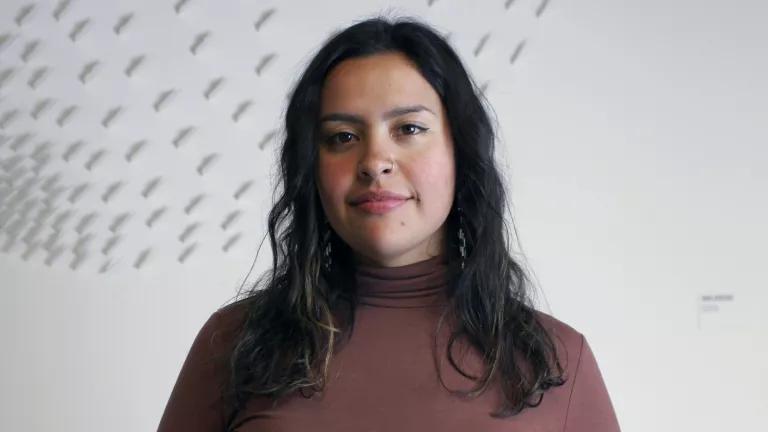Voces for Climate Action
NRDC staffers are helping to build environmental equity and empower Latino voices for climate action—a cause that hits close to home.

NRDC media relations assistant Lauren Gonzalez in the Chicago office, January 2020
During National Hispanic American Heritage Month last fall, several NRDC staffers took to Instagram to celebrate their cultural roots and the ways in which their unique experiences influence their work. In one video, Lauren Gonzalez, a first-generation Mexican-American media relations assistant based in Chicago, noted that a recent mapping analysis conducted by NRDC and local community partners found that areas with high concentrations of Latino and Black residents (like Chicago’s Southwest Side, where she grew up) are the most vulnerable to environmental pollution.
From early childhood Gonzalez struggled with asthma, a disease that wasn’t part of her family history but tied directly to her neighborhood’s industrial legacy. This experience helped bring her to NRDC and remains her biggest motivator for creating change. “No one is going to fight as hard to build equity and environmental justice in disenfranchised areas than those who have lived in those places,” she says.
More than 59 million Latinos live in the United States. The environmental injustices they face aren’t unique to Chicago; Latinos are at ground zero for climate impacts in many places where they live and work. The problem is exacerbated by the challenges they often face in gaining access to health care—an injustice that only grew more dire this year as public health experts have shown long-term exposure to pollution has been found to significantly increase the risk of dying from COVID-19. Latinos are also overwhelmingly supportive of protecting future generations from environmental threats; a 2017 study published by the Yale Program on Climate Change Communication found that three in four Latinos in the United States believe President Trump and Congress aren’t doing enough to address climate change. NRDC is committed to mobilizing and supporting Latinos in their push for stronger climate action.

Since joining NRDC in 2005, Linda Escalante has worked to empower Latinos to engage in advocacy and activism around climate and health. “We’re asking people not just to sign on to what we’re doing,” she says, “but to actually sit at the table and have a voice and some influence in the policymaking.”
Today, as NRDC’s legislative director for Southern California, Escalante lobbies, cultivates relationships, and builds coalitions that help amplify those voices. She was also instrumental in laying the foundation for NRDC’s Latino outreach with the creation of La Onda Verde and Voces Verdes, in 2008 and 2009, respectively. La Onda Verde is the organization’s Spanish-language website; Voces Verdes is a network of Latino business, public health, and community leaders and organizations uniting to engage on climate change issues and to advocate for strong clean energy legislation.
As with Gonzalez, Escalante’s dedication to this work is personal. She moved to California from Bogotá, Colombia, at 10 years old, her family finding housing a half block from a Superfund cleanup site. Her single mother worked in what she calls “every hard immigrant job” she could find to make ends meet. “Living in that struggle, that economic hardship, made me understand how hard it is to deal just with the day-to-day, much less with the existential threat of climate change,” Escalante says.

Reaching people where they are, on topics that resonate with their daily lives, is a critical part of NRDC’s communications strategy to harness the desire among Latinos to act on climate. Fabiola Nuñez, a strategic communications manager, stresses the importance of Spanish-language outreach to ensure that people can stay informed about how environmental issues affect them directly. To that end, the media team has focused on cultivating partnerships with outlets including Univision’s Despierta América (the top morning show on Spanish-language television) and SuMédico.com (a website focused on health and wellness) to share stories that highlight topics such as the extreme health costs of climate change, a burden that is likely to disproportionately impact Latinos in the United States.
Nuñez, a native of Nicaragua, also recorded her own National Hispanic American Heritage Month Instagram video. In it she emphasized Latinos’ unity around caring for the environment but also highlighted an important reason why it’s so critical to be at the table, on the streets, and on our televisions. “At a time when we’re experiencing heightened xenophobia and bigotry, it’s more important now than ever to be visible, to be proud, and to show off our Latinidad,” she said. “Because that in itself is an act of resistance.”
This NRDC.org story is available for online republication by news media outlets or nonprofits under these conditions: The writer(s) must be credited with a byline; you must note prominently that the story was originally published by NRDC.org and link to the original; the story cannot be edited (beyond simple things such as grammar); you can’t resell the story in any form or grant republishing rights to other outlets; you can’t republish our material wholesale or automatically—you need to select stories individually; you can’t republish the photos or graphics on our site without specific permission; you should drop us a note to let us know when you’ve used one of our stories.


Heat Stress Is Killing Workers. States Can Protect Them.
Four Poets Honor Chicago’s Hazel M. Johnson, the Mother of Environmental Justice
Illinois Shows Us What the Road to Clean Energy Should Look Like